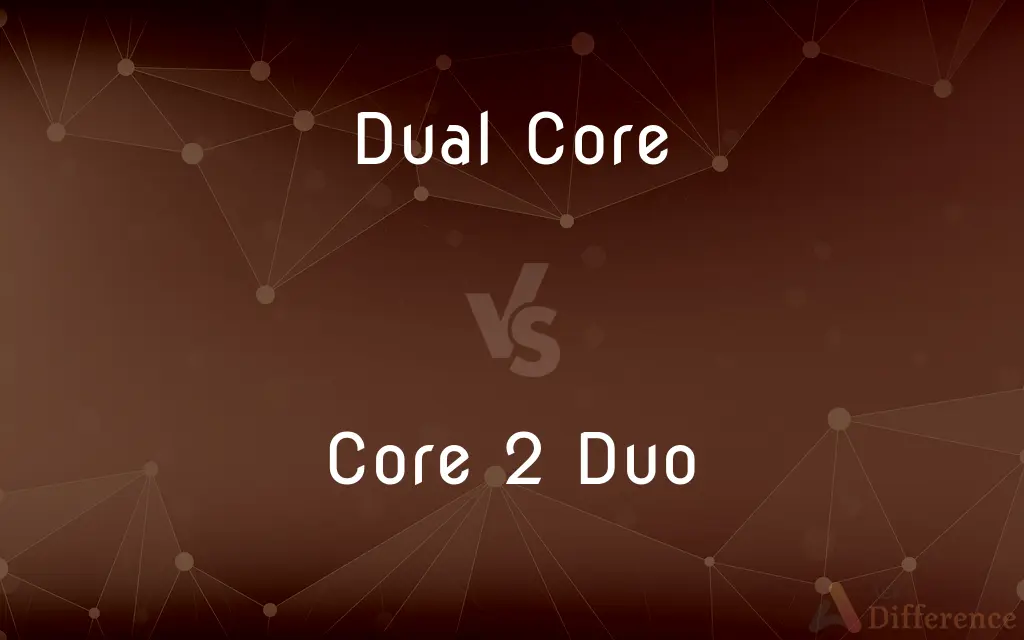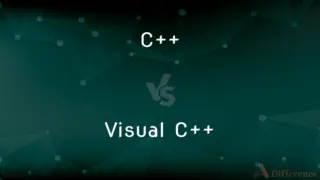Dual Core vs. Core 2 Duo — What's the Difference?
Edited by Tayyaba Rehman — By Fiza Rafique — Published on January 10, 2024
Dual Core refers to any CPU with two cores, while Core 2 Duo is Intel's specific brand of dual-core processors.

Difference Between Dual Core and Core 2 Duo
Table of Contents
ADVERTISEMENT
Key Differences
Dual Core processors have two independent units. Core 2 Duo, developed by Intel, is a specific series of Dual Core processors.
Dual Core enhances performance by multitasking. Core 2 Duo offers energy efficiency and enhanced performance.
Dual Core technology appears in various brands. Core 2 Duo is exclusive to Intel.
Dual Core processors vary in capabilities. Core 2 Duo has shared L2 cache and optimized architecture.
Both Dual Core and Core 2 Duo support multitasking, but Core 2 Duo has specific Intel technologies.
ADVERTISEMENT
Comparison Chart
Brand Specificity
Generic term for two-core CPUs
Intel's specific brand
Performance
Varies by manufacturer
Optimized for energy efficiency
Architecture
Depends on the brand
Intel's microarchitecture
Availability
Multiple brands
Exclusive to Intel
Technological Features
Basic dual-core functionality
Intel-specific enhancements
Compare with Definitions
Dual Core
Enhances computing performance.
Dual Core technology improved the speed of my laptop.
Core 2 Duo
Known for energy efficiency.
The Core 2 Duo is great for reducing power consumption.
Dual Core
A CPU with two processing units.
My computer's Dual Core processor handles multitasking well.
Core 2 Duo
Includes shared L2 cache.
The shared L2 cache in Core 2 Duo enhances performance.
Dual Core
Common in modern computers.
Most new computers now come with at least a Dual Core processor.
Core 2 Duo
Specific to Intel.
Core 2 Duo processors are exclusive products of Intel.
Dual Core
Varies across manufacturers.
Dual Core processors from different brands have distinct capabilities.
Core 2 Duo
Intel's brand of dual-core processors.
My old PC has an Intel Core 2 Duo processor.
Dual Core
Allows simultaneous processing.
The Dual Core CPU enables running multiple applications at once.
Core 2 Duo
Optimized microarchitecture.
Core 2 Duo's architecture provides a smoother computing experience.
Common Curiosities
Can Core 2 Duo handle multitasking?
Yes, Core 2 Duo can handle multitasking efficiently.
What is a Core 2 Duo?
Core 2 Duo is a specific series of dual-core processors developed by Intel.
Is Core 2 Duo still relevant?
While older, Core 2 Duo processors can still be effective for basic computing.
Are all Dual Core processors Core 2 Duo?
No, Core 2 Duo is a specific brand by Intel, while Dual Core is a general term.
What’s the advantage of a Dual Core CPU?
Dual Core CPUs offer better multitasking and overall performance than single-core CPUs.
Is Core 2 Duo energy efficient?
Yes, Core 2 Duo processors are designed for energy efficiency.
Do Dual Core processors heat up quickly?
It depends on the specific model and usage, but they generally have decent heat management.
What is a Dual Core processor?
A Dual Core processor has two independent processing units.
Is Core 2 Duo good for gaming?
Core 2 Duo may handle older games but is not ideal for modern, demanding games.
Do Dual Core processors differ by brand?
Yes, Dual Core processor capabilities can vary between manufacturers.
How does Core 2 Duo compare to newer processors?
Newer processors generally offer better performance and more features than Core 2 Duo.
Are Dual Core processors obsolete?
While older, Dual Core processors can still be adequate for basic tasks and are not entirely obsolete.
Can I upgrade from Dual Core to Core 2 Duo?
It depends on your motherboard’s compatibility with Core 2 Duo processors.
What tasks are Dual Core processors good for?
Dual Core processors are suitable for basic computing tasks and light multitasking.
Does Core 2 Duo support 64-bit operating systems?
Yes, most Core 2 Duo processors support 64-bit operating systems.
Share Your Discovery

Previous Comparison
ACA vs. ACCA
Next Comparison
C++ vs. Visual C++Author Spotlight
Written by
Fiza RafiqueFiza Rafique is a skilled content writer at AskDifference.com, where she meticulously refines and enhances written pieces. Drawing from her vast editorial expertise, Fiza ensures clarity, accuracy, and precision in every article. Passionate about language, she continually seeks to elevate the quality of content for readers worldwide.
Edited by
Tayyaba RehmanTayyaba Rehman is a distinguished writer, currently serving as a primary contributor to askdifference.com. As a researcher in semantics and etymology, Tayyaba's passion for the complexity of languages and their distinctions has found a perfect home on the platform. Tayyaba delves into the intricacies of language, distinguishing between commonly confused words and phrases, thereby providing clarity for readers worldwide.
















































